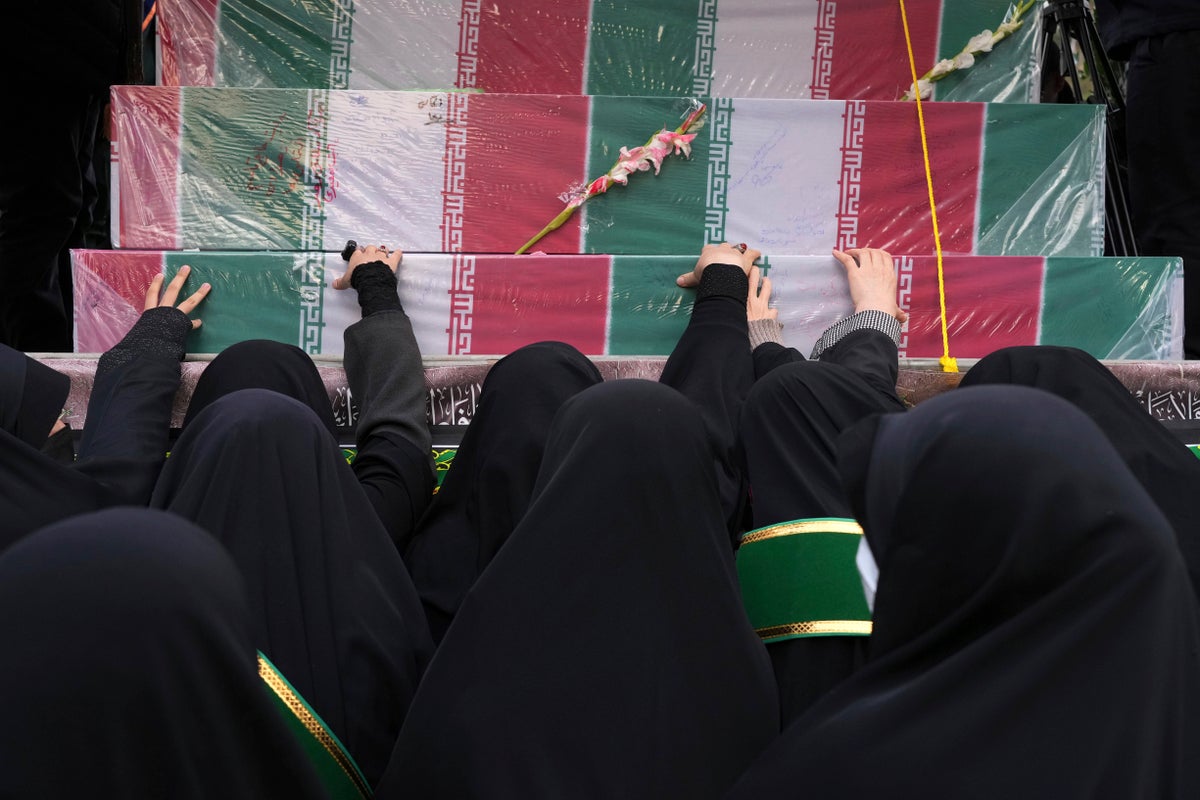
Thousands of Iranians on Tuesday attended state-organized funerals for 400 soldiers killed in the 1980s Iran-Iraq war. Iran's president, meanwhile, lashed out at the United States and its allies, accusing them of fomenting anti-government protests that have been underway in Iran for over three months.
Caskets with the remains of “unidentified martyrs" were draped in Iranian flags and carried in mass processions. For many Iranian families, the conflict’s painful legacy drags on in a continuous waiting for news of loved ones still “missing.”
In January, 250 Iranian soldiers killed in the 1980-1988 war were buried in similar ceremonies.
Iran has been shaken by mass protests since mid-September over the death of Mahsa Amini, a 22-year-old Iranian Kurdish woman who died after being detained by the country’s morality police.
The protests rapidly escalated into calls for the overthrow of Iran’s theocracy, established after the 1979 Islamic Revolution, marking one of the biggest challenges to the Iranian clerical rule in over four decades.
At least 507 protesters have been killed and more than 18,500 people have been arrested, according to Human Rights Activists in Iran, a group that has closely monitored the unrest. Iranian authorities have not released figures for those killed or arrested.
In the capital, Tehran, the last farewell on Tuesday honored 200 soldiers whose remains were recently recovered from the former battlefields along the Iraq-Iran border. Funerals were held for another 200 soldiers in other cities and towns across Iran. None of the soldiers have been identified and their remains were to be buried as “unknown martyrs” in mass funerals.
From outside of Tehran University, trucks piled high with the caskets made their way through the streets. Men and women in black thronged the coffins, many weeping for those lost in the bloody, stalemated war started by Iraq's Saddam Hussein and his Baath Party in 1980.
Iran and Iraq sporadically exchange remains of soldiers recovered from borderland territory that witnessed major combat in the war, which left more than a million casualties on both sides.
Iranian state TV said the remains buried Tuesday were of troops killed in four battlefields, including in two locations inside Iraq. Along with the Iranian flag, many people also carried photographs of a top Iranian general, Qassem Soleimani, who was killed by a U.S. drone strike in January 2020 in Baghdad.
President Ebrahim Raisi and other top officials attended the ceremonies and praised “the martyrs,” saying they help improve the nation’s sprit, according to media reports.
Speaking at the ceremony, Raisi said efforts by the enemies of the nation — a reference to the U.S. and its allies — have sought to “pressure Iran during the recent protests" but have met with failure. Iranian authorities have blamed the unrest on their foreign adversaries, including the U.S. and Israel.
“In recent riots, the arrogance (of the U.S. and its allies) was displayed in all its strength,” said Raisi, but “all pressures against the Islamic Republic were doomed to fail.”
Earlier in December, Iran executed two prisoners, both 23 years old and charged in connection with the mass protests. The first was Mohsen Shekari, accused by an Iranian court of blocking a street in Tehran and attacking a member of the country’s security forces with a machete.
The second was Majidreza Rahnavard, whose body was left hanging from a construction crane as a gruesome warning to others. Authorities alleged Rahnavard had stabbed two members of its paramilitary force. The executions prompted international outcry. Reportedly, dozens of others remain on the list for executions.
Tuesday's funerals come just days ahead of the third anniversary of the Iranian military’s downing of a Ukrainian passenger plane with two surface-to-air missiles, killing all 176 people on board — a tragedy that ignited an outburst of unrest across Iran and further damaged its relations with the West.







